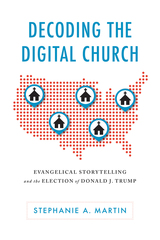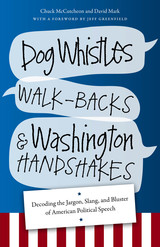4 books about Decoding

Decoding the Digital Church
Evangelical Storytelling and the Election of Donald J. Trump
Stephanie A. Martin
University of Alabama Press, 2021
A nuanced look at the rhetorical narratives used by conservative Republicans and evangelicals to make both personal and political choices
As a political constituency, white conservative evangelicals are generally portrayed as easy to dupe, disposed to vote against their own interests, and prone to intolerance and knee-jerk reactions. In Decoding the Digital Church: Evangelical Storytelling and the Election of Donald J. Trump, Stephanie A. Martin challenges this assumption and moves beyond these overused stereotypes to develop a refined explanation for this constituency’s voting behavior.
This volume offers a fresh perspective on the study of religion and politics and stems from the author’s personal interest in the ways her experiences with believers differ from how scholars often frame this group’s rationale and behaviors. To address this disparity, Martin examines sermons, drawing on her expertise in rhetoric and communication studies with the benefits of ethnographic research in an innovative hybrid approach she terms a “digital rhetorical ethnography.” Martin’s thorough research surveys more than 150 online sermons from America’s largest evangelical megachurches in 37 different states. Through listening closely to the words of the pastors who lead these conservative congregations, Martin describes a gentler discourse less obsessed with issues like abortion or marriage equality than stereotypes of evangelicals might suggest. Instead, the politicaleconomic sermons and stories from pastors encourage true believers
to remember the exceptional nature of the nation’s founding while also deemphasizing how much American citizenship really means.
Martin grapples with and pays serious, scholarly attention to a seeming contradiction: while the large majority of white conservative evangelicals voted in 2016 for Donald J. Trump, Martin shows that many of their pastors were deeply concerned about the candidate, the divisive nature of the campaign, and the potential effect of the race on their congregants’ devotion to democratic process itself. In-depth chapters provide a fuller analysis of our current political climate, recapping previous scholarship on the history of this growing divide and establishing the groundwork to set up the dissonance between the political commitments of evangelicals and their faith that the rhetorical ethnography addresses.
As a political constituency, white conservative evangelicals are generally portrayed as easy to dupe, disposed to vote against their own interests, and prone to intolerance and knee-jerk reactions. In Decoding the Digital Church: Evangelical Storytelling and the Election of Donald J. Trump, Stephanie A. Martin challenges this assumption and moves beyond these overused stereotypes to develop a refined explanation for this constituency’s voting behavior.
This volume offers a fresh perspective on the study of religion and politics and stems from the author’s personal interest in the ways her experiences with believers differ from how scholars often frame this group’s rationale and behaviors. To address this disparity, Martin examines sermons, drawing on her expertise in rhetoric and communication studies with the benefits of ethnographic research in an innovative hybrid approach she terms a “digital rhetorical ethnography.” Martin’s thorough research surveys more than 150 online sermons from America’s largest evangelical megachurches in 37 different states. Through listening closely to the words of the pastors who lead these conservative congregations, Martin describes a gentler discourse less obsessed with issues like abortion or marriage equality than stereotypes of evangelicals might suggest. Instead, the politicaleconomic sermons and stories from pastors encourage true believers
to remember the exceptional nature of the nation’s founding while also deemphasizing how much American citizenship really means.
Martin grapples with and pays serious, scholarly attention to a seeming contradiction: while the large majority of white conservative evangelicals voted in 2016 for Donald J. Trump, Martin shows that many of their pastors were deeply concerned about the candidate, the divisive nature of the campaign, and the potential effect of the race on their congregants’ devotion to democratic process itself. In-depth chapters provide a fuller analysis of our current political climate, recapping previous scholarship on the history of this growing divide and establishing the groundwork to set up the dissonance between the political commitments of evangelicals and their faith that the rhetorical ethnography addresses.
[more]

Decoding the Rabbis
A Thirteenth-Century Commentary on the Aggadah
Marc Saperstein
Harvard University Press, 1980

Decoding the Sino-North Korean Borderlands
Adam Cathcart
Amsterdam University Press, 2020
In the past decade, the Chinese-North Korean border region has undergone a gradual transformation into a site of intensified cooperation, competition, and intrigue. These changes have prompted a significant volume of critical scholarship and media commentary across multiple languages and disciplines. Drawing on existing studies and new data, this volume brings much of this literature into concert by pulling together a wide range of insight on the region's economics, security, social cohesion, and information flows. Drawing from multilingual sources and transnational scholarship, the volume is enhanced by the extensive fieldwork undertaken by the editors and contributors in their quest to decode the borderland. In doing so, the volume emphasizes the link between theory, methodology, and practice in the field of Area Studies and social science more broadly.
[more]

Dog Whistles, Walk-Backs, and Washington Handshakes
Decoding the Jargon, Slang, and Bluster of American Political Speech
Chuck McCutcheon and David Mark
University Press of New England, 2014
To the amusement of the pundits and the regret of the electorate, our modern political jargon has become even more brazenly two-faced and obfuscatory than ever. Where once we had Muckrakers, now we have Bed-Wetters. Where Blue Dogs once slept peaceably in the sun, Attack Dogs now roam the land. During election season—a near constant these days—the coded rhetoric of candidates and their spin doctors, and the deliberately meaningless but toxic semiotics of the wing nuts and backbenchers, reach near-Orwellian levels of self-satisfaction, vitriol, and deceit. The average NPR or talk radio listener, MSNBC or Fox News viewer, or blameless New York Times or Wall Street Journal reader is likely to be perplexed, nonplussed, and lulled into a state of apathetic resignation and civic somnolence by the rapid-fire incomprehensibility of political pronouncement and commentary—which is, frankly, putting us exactly where the pundits want us. Dog Whistles, Walk-Backs, and Washington Handshakes is a tonic and a corrective. It is a reference and field guide to the language of politics by two veteran observers that not only defines terms and phrases but also explains their history and etymology, describes who uses them against whom, and why, and reveals the most telling, infamous, amusing, and shocking examples of their recent use. It is a handbook of lexicography for the Wonkette and This Town generation, a sleeker, more modern Safire’s Political Dictionary, and a concise, pointed, bipartisan guide to the lies, obfuscations, and helical constructions of modern American political language, as practiced by real-life versions of the characters on House of Cards.
[more]
READERS
Browse our collection.
PUBLISHERS
See BiblioVault's publisher services.
STUDENT SERVICES
Files for college accessibility offices.
UChicago Accessibility Resources
home | accessibility | search | about | contact us
BiblioVault ® 2001 - 2024
The University of Chicago Press









